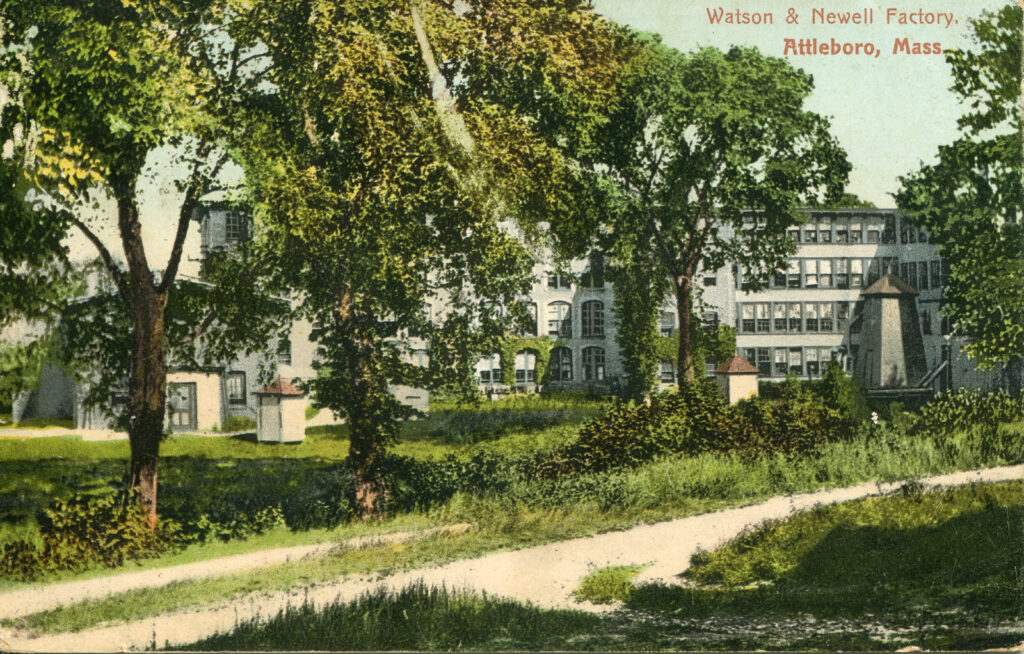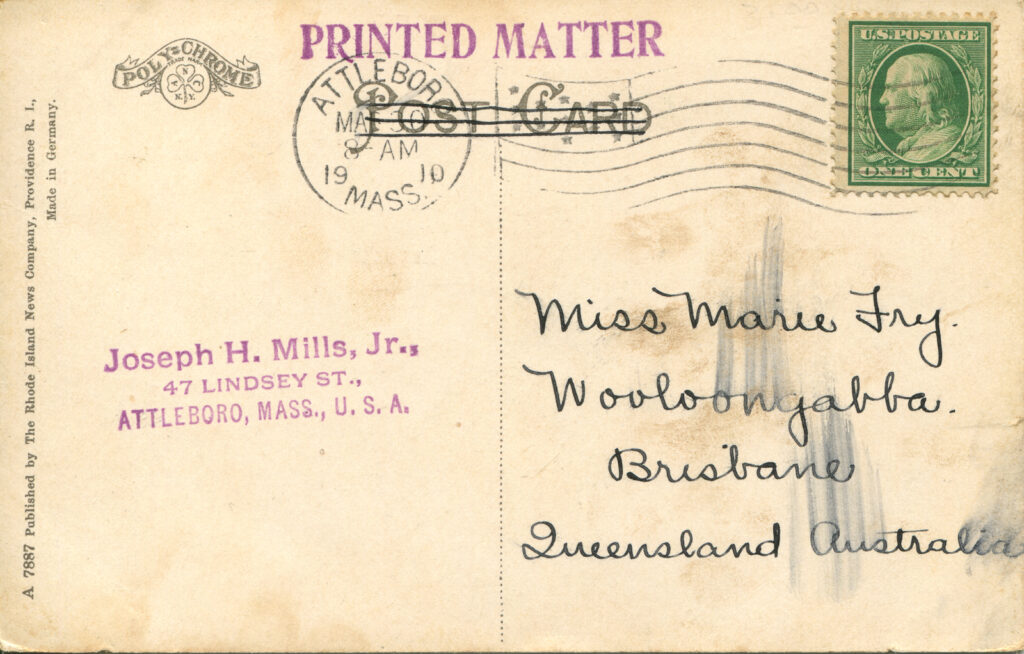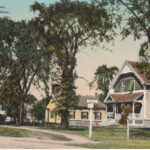

Transcription:
Miss Marie Fry,
Woolloongabba,
Brisbane,
Queensland, Australia
Joseph H. Mills, Jr.
47 Lindsey St.,
Attleboro, Mass., U.S.A.
Postmarked:
May 30, 1910, Attleboro, Mass.
1908 1c Benjamin Franklin, green, perforated, type IV
History and Notes:
Context: Main Image: The postcard depicts the 1894 Watson & Newell Factory on Mechanic St. in Attleboro, Massachusetts, with the factory buildings partially obscured by greenery.
Details: Foreground:
- The image features a dirt path that runs horizontally across the bottom part of the postcard, with some grassy areas on either side.
- Large, mature trees frame the view, creating a natural canopy that partially conceals the factory buildings behind them.
Middle Ground:
- The factory buildings are visible through the trees, showcasing a multi-story industrial structure with numerous large windows.
- The buildings are covered with ivy and surrounded by well-maintained grassy areas, giving the factory a picturesque appearance.
- Small outbuildings or utility structures are scattered around the factory grounds, adding to the sense of an active industrial site.
Background:
- The background consists of more trees and foliage, indicating that the factory is set within a green, possibly park-like environment.
- The factory buildings extend into the distance, suggesting the large size of the industrial complex.
Text:
- The top right of the postcard reads “Watson & Newell Factory,” in red text.
- Below it, also in red text, it states “Attleboro, Mass.”
Condition:
- The postcard is in good condition, with vibrant colors and clear details.
- There are some faint marks or lines, but they do not significantly detract from the overall quality of the image.
Interpretation: Historical Context:
- The Watson & Newell Factory represents a significant part of Attleboro’s industrial heritage, likely involved in manufacturing jewelry or other goods, as the city was known for its jewelry industry.
- The presence of extensive greenery suggests that the factory was designed to blend with its natural surroundings, possibly reflecting early 20th-century industrial aesthetics and environmental considerations.
- The Watson, Newell & Company Factory is an 8.85-acre former industrial property in Attleboro, Massachusetts. Used for the manufacture of silver jewelry and flatware from 1894 to 1955, the Watson, Newell & Company Factory is a well-preserved, representative example of late 19th- and early 20th-century industrial architecture in a modest interpretation of the Classical Revival style. The parcel contains eight contributing brick and wood-frame buildings constructed between 1894 and ca. 1916. Six of the buildings are attached; two are detached. (MACRIS ATT.AB, NRIND)
- Since 2019 the property is a 55+ community called Sterling Lofts.
Cultural Importance:
- Factories like Watson & Newell were central to the economic development of Attleboro, providing employment and contributing to the town’s growth.
- The postcard’s depiction of the factory in a picturesque, almost idyllic setting indicates the importance of the industry within the community.
Artistic Elements:
- The contrast between the industrial buildings and the lush greenery highlights the factory’s integration into its natural environment.
- The use of color and light creates a serene and inviting atmosphere, which may have been intended to reflect the prosperity and harmony associated with the factory.
Overall Impression:
- This postcard effectively captures the Watson & Newell Factory within a verdant, almost park-like setting, showcasing the balance between industrial development and natural beauty.
- The combination of the factory buildings, the trees, and the grassy areas provides a comprehensive view of this important industrial site in Attleboro.
- The postcard serves as a valuable piece of historical documentation, illustrating the architectural and environmental landscape of early 20th-century Attleboro.
Additional Details: [1908 1c Benjamin Franklin, green, perforated, type IV]
Tags:
Share This Article




